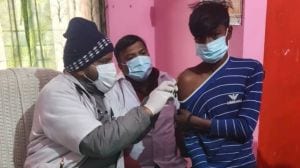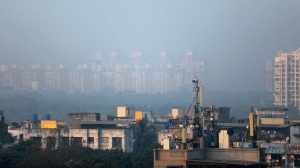World Briefing
Korea may sell state-run firms to foreignersSouth Korea will start to sell state-run corporations to foreign investors in the second half of...

Korea may sell state-run firms to foreigners
South Korea will start to sell state-run corporations to foreign investors in the second half of this year, Korean television said on Sunday. The Korea Broadcasting System, quoting a senior official at the Planning and Budget Commission, said the sales could be done through complete or partial sale of the corporations or stake sales. The corporations would include Pohang Iron and Steel Corp, Korea Electric Power Corp, unlisted Korea Telecom and Korea Tobacco and Ginseng Corp, it said. Commission officials were not available for comment. In May, the Korea Institute for Industrial Economics and Trade said South Korea could raise 17.4 billion to 22 billion over the next two years by selling 12 corporations which the government either owns outright or controls. Selling state-run and state-controlled companies has been discussed more often recently as the country struggles to overcome an economic crisis.
S.Korea8217;s Posco to end management inHan:South Korea8217;s Pohang Iron and Steel Co Ltd Posco said on Sunday it has decided to end participation in the management of failed Hanbo Steel Co. Posco said in a statement it had been involved in sales of Hanbo8217;s products and purchase of raw materials for the company since February 1997. It said the move was to put more focus on its own business and restructuring. The statement also said Posco planned to halt construction of its two-million-tonne-a-year mini-mill in Kwangyang, South Cholla province, on worries of oversupply and difficulties in financing. It will also reconsider joint venture plans to build a galvanised steel plant in Dalian, China, a continuous galvanised iron plant in Guangdong, China, and a mini-mill and cold-rolled stainless steel plant in Indonesia.
Kato says Japan economy will improve: Japan8217;s ruling Liberal Democratic Party secretary-general Koichi Kato said on Sunday that the economy should start to show some improvement in the second half of the year. quot;We are nowtrying to implement public works spending quickly and when this happens, there will be a good effect on the real economy which will appear around the beginning of autumn,quot; Kato said on a programme from national public broadcaster NHK. Kato said that the most important thing that could be done for the economy was solving Japan8217;s bad loan problems.
Blair defends policies, confronts rebels:British prime minister Tony Blair on Sunday defended his Labour government8217;s decision to give the Bank of England freedom to set interest rates. The Bank of England, given independence over monetary policy within days of Labour8217;s general election victory in May 1997, angered businessmen on Thursday by raising interest rates to 7.5 per cent in order to keep a lid on inflation.
Exporters and manufacturers in particular said the quarter-point rise, the sixth since the election, was unnecessary and could cause a hard landing for the economy. Writing in the Sunday Telegraph newspaper, Blair said the increases, totalling1.5 percentage points, were painful but he was unrepentant. All leading low-inflation countries had independent central banks, Blair said. quot;The decision to take monetary policy out of the political arena was brave and right. It does not of course avoid the political attacks that attach to any rate rise, but it does remove the political temptation to play politics with monetary stability,quot; he said.
Blair also shrugged off criticism levelled against him and finance minister Gordon Brown for reining in public spending at a time when buoyant tax revenues have virtually eliminated the government8217;s budget deficit.
Evacuation of foreigners from Eritrea ends:The evacuation of foreigners fleeing the conflict in the Horn of Africa ended in the Eritrean capital Asmara early on Sunday, witnesses said. An Italian military aircraft carrying about 130 Italians, South Koreans and Germans left Asmara at around O200 GMT and headed for the neighbouring Red Sea state of Djibouti from where connection flights would beavailable to Europe and elsewhere. The departure of the Italian aircraft ended the busiest night in the history of Asmara International airport since Eritrea ceased to be a province of Ethiopia and gained independence in 1993. Airport officials estimated up to 1,500 foreigners had lefton board a dozen planes overnight. About 200 Ethiopians were also flown out as a security measure against possible reprisals, the officials said. Those departing included many women and children. Evacuees stood in long queues for most of the cold night waiting for their papers to be processed or their names to be called out from a register.
Small IPOs find room in gloomy Hong Kong market: Big initial public offeringsIPO are unlikely during the economic gloom in Hong Kong but smaller issues might find some place, equity analysts said. quot;There is very little chance for the success of any big issue in today8217;s subdued market, but small issues could have a chance to be absorbed by the market,quot; said Patrick Cheng, acorporate finance director at HSBC Investment Banking.
Smaller firms might also turn to initial public floats because borrowing money from banks is now harder due to tighter lending policies, analysts said. quot;Despite the gloom, small firms may try to tap the market,particularly when its less volatile,quot; said Dennis Leung, research manager from Jamp;A Securities. Analysts said investors were cautious in the turbulent market and were unwilling to invest in big issues in the absence of sufficient liquidity. quot;It the market turnover dropped last month, and probably it will drop a bit more this month,quot; said Howard Gorges, a director of South China Brokerage.
- 0110 hours ago
- 0219 hours ago
- 0310 hours ago
- 0411 hours ago
- 056 hours ago































